I Need Help With...
Whether you are experiencing symptoms related to depression, anxiety, problems with substance use or any other mental health concern, we will partner with you to understand your unique needs and build an individual treatment plan. Our mission at Intermountain is helping people live the healthiest life possible, which we achieve by treating both mind and body.
Our Treatment Programs
Behavioral Health Services at Intermountain offers a variety of resources to keep your body and mind healthy. Just as Intermountain is here for your physical healthcare needs, we are here to provide for your emotional and mental well-being as well. Our treatment programs provide help for mental health and substance use disorders.


